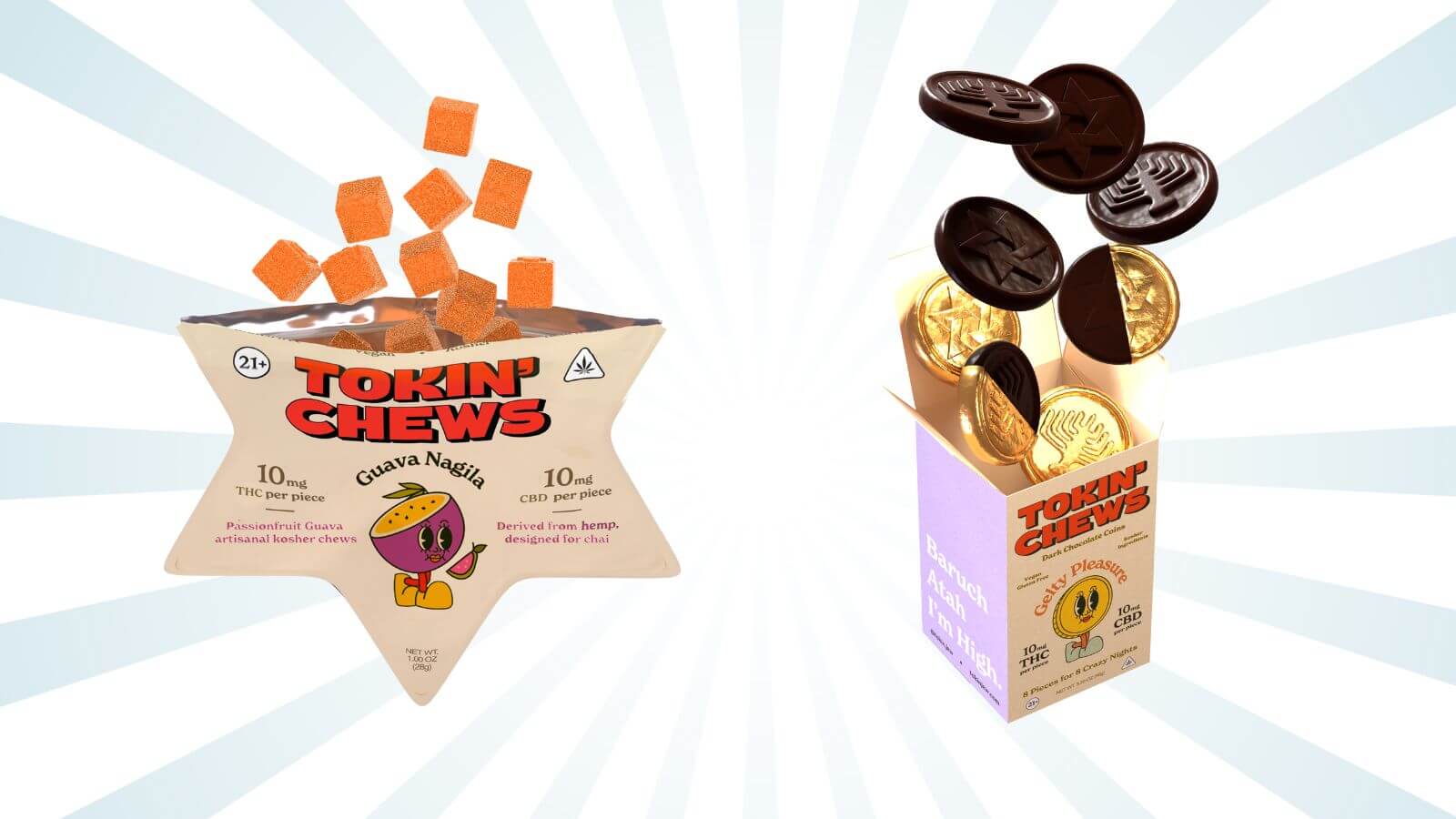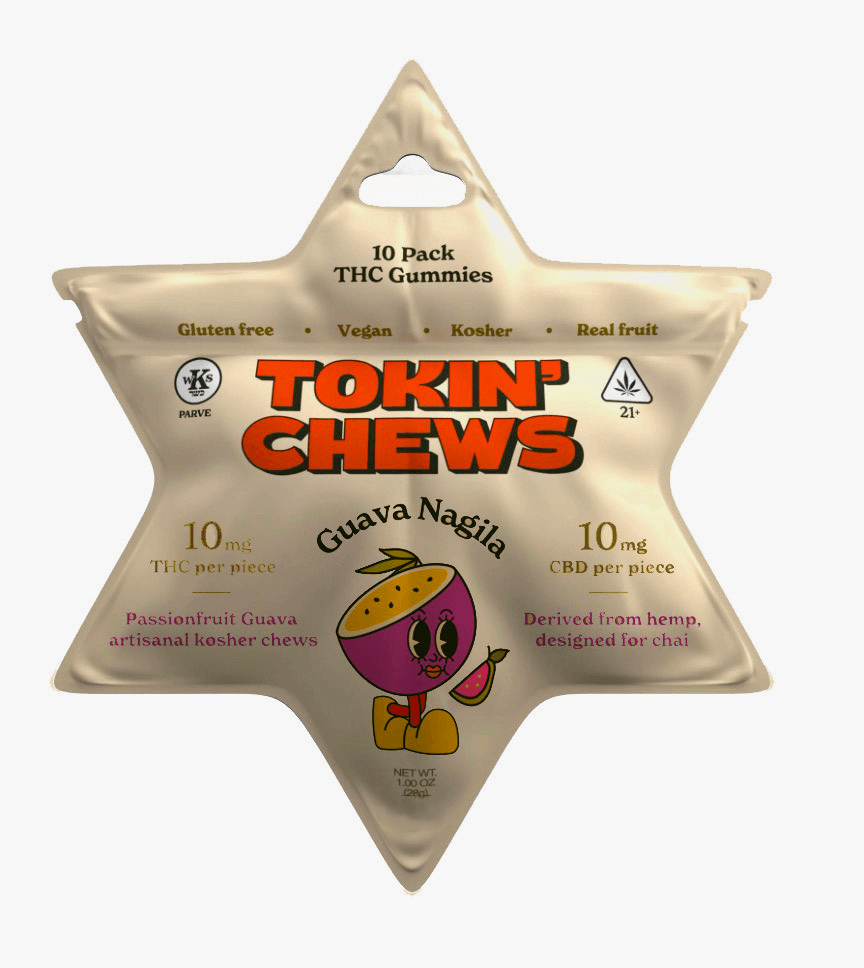Kosher cannabis? These gummy edibles have a rabbi’s seal of approval — and a following
Tokin’ Jew wanted to make a product that could be enjoyed by every kind of Jew, including those who keep kosher

Tokin’ Jew sells kosher cannabis edibles in a variety of Jewish-themed flavors, including special releases for holidays. Courtesy of Tokin’ Jew
Tu B’Shvat is the Jewish day of the trees, a celebration of all things plant and fruit. And what better way to celebrate than by getting a little, well, celebratory with a plant? It may be a minor holiday religiously, but there’s no reason it can’t be a “chai” holiday.
That’s the vision of Will Cohen and Ben Kraim, founders of Tokin’ Jew, a Jewish cannabis brand. Tu B’Shvat is “obviously our holiday,” Cohen said. But they’ve taken a Jewish spin to cannabis for all occasions.
What started out as a meme page riffing about smoking for Shabbat or making a bong out of a Manischewitz bottle has grown into a full-fledged company selling accessories for smoking — dreidl-shaped grinder, anyone? Or perhaps a pipe shaped like a shofar? — as well as themed T-shirts and hats. And recently, they’ve added to their lineup: kosher-certified, THC-infused gummies and chocolate gelt.
“Tokin’ Chews,” as they’ve dubbed the edibles line, launched for Rosh Hashanah with a limited release sour apple flavor called “apple of my chai.” There’s also “Watermelon Sugar Chai,” a riff on the Harry Styles song, raspberry “Sufganjayot” — “they may not be fried but it’ll sure get you baked” — and, of course, a special flavor, Guava Nagila, for Tu B’Shvat.
All the gummies arrive in a Star of David-shaped package with a hechsher, or kosher seal, and each one is imprinted with Jewish symbols such as a chai, dreidl or hamsa. (The chocolate gelt is not hechshered yet; they’re working on it, but assured me that the chocolate they start with is kosher.)
Kashering cannabis

The road to certifying their product as kosher was, of course, a bit twisty. Cohen, 28, grew up Reform, and had been running the Tokin’ Jew page for years when he reached out to Kraim to help the brand expand. Kraim, 36, grew up Modern Orthodox, and felt it was important to get a hechsher on any edibles they produced to be as inclusive as possible.
The pair got in touch with Rabbi Yaakov Cohen, an originally Texas-based rabbi who oversees kashrut for Whole Kosher Services. The rabbi had already had his own experience with the medicinal qualities of marijuana due to his son’s illness, and has written extensively on the importance of medical marijuana, so he was open to the idea of certifying the edibles.
He was able to connect the brand’s founders to a Jewish candymaker who was already hoping to create a kosher candy line. The rabbi certified the facility as kosher, and they were off with their Rosh Hashanah launch.
The kosher journey also ended up meaning that Tokin’ Chews are just, well, more creative — and more natural — than a lot of what is on the market. The candymaker with whom the rabbi connected them to produce the edibles had been producing artisanal products before signing on with the cannabis brand, so he was able to make a wide variety of elevated flavors. And the kosher certification meant that they couldn’t use gelatin or as many synthetic ingredients.
“In the dispensary game, it’s a complete black box. The amount of ingredients on every edible, you can’t even make your way through it,” said Cohen. “We were very keen on finding someone who used pectin, but also real fruit puree.”
And Cohen and Kraim feel personally accountable to the customers who are drawn to their specific niche.
“I feel like we have this natural Jewish guilt where we have to find the best stuff,” added Kraim. “I have this vision of someone’s mom coming to me and saying, ‘There’s so many products, I don’t know who to trust, and you look like someone my kids would be friends with — can you tell me what’s good?’”
Do Jews get ‘chai’?
Perhaps the market for kosher edibles seems rather small. No one really pictures Jews, or at least not the ones religious enough to care about kosher certification, toking up.
“The reason that the brand began in the first place was that it was kind of a way to connect Jews that are a little bit on the periphery of their Judaism back to their Judaism,” said Cohen. “It’s really all about comedy, and making people proud to be Jewish in this kind of funny way.”
“Maybe there’s one percent of people who comment ‘That’s too far’ and then 11 people will comment, like, ‘Actually the Halacha says…’”Ben KraimCo-founder of Tokin’ Jew
But, Cohen said, a real community has arisen around their offerings, including casual Jews who come for the jokes, religious people who appreciate the hechsher and even non-Jews who just enjoy the vibes on the Instagram page — and the products.
The community is so engaged that they hardly need to think of their own new product ideas; the pair said that nearly half of their products are the result of a poll posted to their Instagram page asking people what else they’d like to see made.
They’ve even been able to post educational content about the history of different holidays, along with their themed flavor launches.
“Obviously our red thread will be comedy and that’s what draws people to our page,” Cohen said. “But I think we’ve been able to tap into the educational side of things.”
For anyone who thinks that a product is going too far with its accessories, which include items like a Torah-shaped rolling device called the “Joint Scroller,” or that cannabis shouldn’t be kosher, the community is ready to argue the point — and argue it Jewishly.
“So much of Judaism is arguing what’s allowed and what’s not,” said Kraim. “Maybe there’s one percent of people who comment ‘That’s too far’ and then 11 people will comment, like, ‘Actually the Halacha says…’”
And the education isn’t limited to Talmudic arguments about marijuana. For non-Jews who come to the page, it is often sort of shocking to realize that religious Jews smoke weed. But commenters are quick to educate them. Tokin’ Jew, Kraim said, “humanizes Jews” for those who stumble upon the page with an idea that anyone who keeps kosher or is Jewish inhabits in a strange, foreign world.
“It’s interesting how weed says so much. Like it humanizes, for non-Jewish people looking in, and it also speaks to Jews who maybe are less religious or kind of stepped away from the religion,” Kraim said. “All they have to see is weed and it says ‘they’re chill, they’re accepting.’”
Plus, Cohen added, there’s a pragmatic benefit to making cannabis Jewish. Posts about getting high often get flagged and taken down on Instagram. But posts about getting “chai” — those are left up.
















